Cittadinanzattiva discusses the findings of a recent report into the role played by pharmacies in Italy as a part of the move towards ‘pharmacies of services’.
A 2019 civic survey conducted by the Italian NGO Cittadinanzattiva with the collaboration of Federfarma, the national federation representing over 16,000 private pharmacies in Italy, revealed that three-quarters of Italian citizens have a local pharmacy that they trust and which they use. A similar number of people (73%) are aware of the fact that, for several years now, pharmacies have been enabled to provide new services for citizens; while 65% of the population sample perceives pharmacists as professional dispensers of important health advice (Fig. 1 & 2).
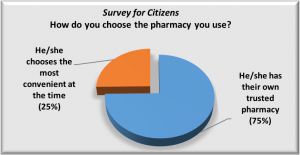
All data are summarised in the Second Edition of the Annual Report on Pharmacies, realised by the Civic Evaluation Agency of Cittadinanzattiva, and available on the NGO website. In this second edition, the civic investigation concerned 10% of the pharmacies present in the territory.
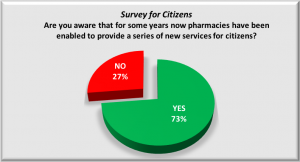
The Report, to which 1,915 pharmacies have contributed, highlights a series of barriers that still hinder the entire transition to the ‘pharmacy of services’, which includes (Fig. 3 & 4):
- The poor involvement of pharmacies (only 20%) in implementing the Electronic Health Record.
- Insufficiently sharing, for the purpose of supporting therapeutic adherence, telematics data between the pharmacy’s management and the information systems both of the Ministry of Health/Italian Medicines Agency-AIFA (34%) and especially GPs (only 12% of the pharmacy’s results were connected with the family doctors).
- The necessity to strengthen dialogue and co-operation on a local level with the realities of civic associations involved in the protection of health as a common good.
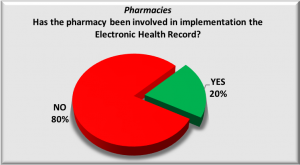
A peculiarity of this second edition of the civic survey is the direct contribution made by of information coming from citizens. Indeed, a survey dedicated to pharmacists and pharmacies has been combined with one dedicated to citizens, since they are the service users: 1,265 people from all Italian regions responded to the survey, with slightly more women (56%) than men responding.
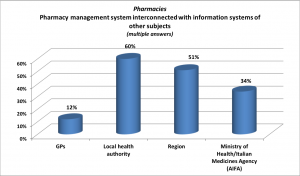
According to the data collected, as anticipated, 65% of citizens affirm that when facing a pharmacist, they are aware of the fact that they are dealing with a professional who gives out important health advice, and certainly not with a medicine salesperson or health centre manager (Fig. 5).
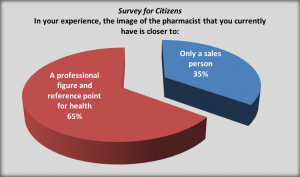
41% of those who took part in the survey said that their pharmacist is in contact with their family doctor or specialist taking care of them, that they know which medicines the person usually takes (42%), and that the pharmacist is able to provide advice regarding dosages or the means of taking a medicine when giving out a prescription (42%). Less frequently, (32%) said that the pharmacist knows their pathologies and takes the initiative to deliver brochures or other information deemed useful to the person who enters the pharmacy (Fig. 6).
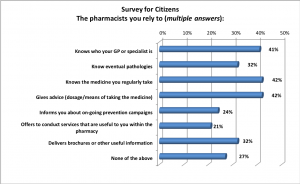
Focus: pharmacies support early diagnosis
As previously mentioned, 1,915 pharmacies belonging to Federfarma across the entire national territory (38% of whom were located in a rural area of the country, with the remaining proportion being in urban areas) took part in the survey. The number of pharmacies increased (by 33%) compared to the first edition, demonstrating a growing interest from those directly involved.
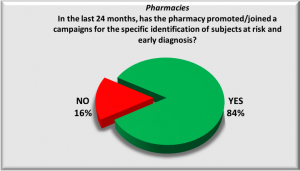
In this second edition, which was realised with the Teva’s unconditional contribution, Cittadinanzattiva focused on two aspects that allow pharmacies to better express their potential both in terms of health in the territory (prevention/screening campaigns) and in terms of support for the improvement of therapeutic adherence, which is perceived as a shared issue across the entire health sector. Here, it was found that the participation of pharmacies in campaigns for early diagnosis is massive: 84% of pharmacies have taken part in such campaigns in the last 24 months. Moreover, 70% of the pharmacies involved in the investigation have also joined institutional prevention campaigns (screenings organised by a region or a local public health authority) related to colorectal cancer. 27% of them have also joined other institutional screenings, mainly concerning diabetes and hypertension (Fig. 7 & 8).
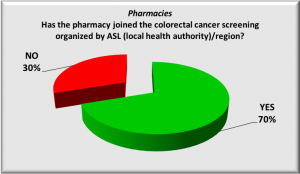
To a lesser extent, pharmacies have also been involved in campaigns in areas such as asthma, breast cancer, cardiovascular diseases, and chronic obstructive pulmonary disease (COPD). The pharmacies’ involvement in such campaigns is seen in an almost unanimously positive light by the citizens express involved in the survey, with 70% of them considering it as being ‘very useful’, and 26% considering it as being ‘quite useful’ (Fig. 9).
Focus: pharmacies support therapeutic adherence
This second edition of the Annual Report on pharmacies in Italy has also shown that pharmacies play a key role in helping to support adherence to therapies. Indeed, 34% of the pharmacies involved in the survey confirmed that they have carried out– in the last two years – projects/initiatives that support therapeutic adherence for people who suffer from chronic diseases (and within this subset of pharmacies, most have implemented one/two initiatives) (Fig. 10).
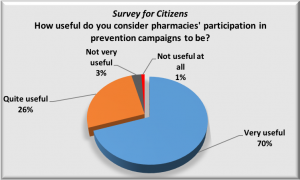
The survey has also demonstrated that, regarding those pathologies for which in it is possible to carry out diagnostic tests/exams in pharmacies, that is diabetes, cardiovascular pathologies, COPD and dyslipidemias, those tests are consistently confirmed (Fig. 11).
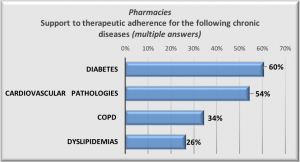
The main functions performed by a pharmacy in support of therapeutic adherence are (Fig. 12):
- An assessment of the patient’s degree of awareness and knowledge of the therapies (71%)
- Personalised advice for those subjects with a low degree of adherence (68%)
- Pharmacological recognition/review (60%) as far as the specific competence of the pharmacist is concerned (e.g. interactions between prescribed medicines and over-the-counter medicines or supplements)
- Explanatory/training sessions on devices and medicines (36%)
- Tutoring the person via appointments in the pharmacy (34%)
- Monitoring vital signs (33%)
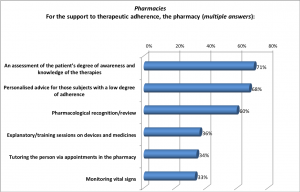
72% of the pharmacists involved in the survey revealed that they consider the training they have received regarding the methodologies and the tools to carry out effective initiatives to support adherence for chronic patients as being appropriate (Fig. 13).
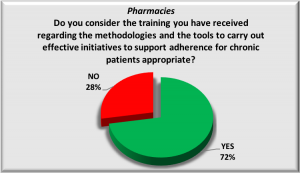
This positive aspect, however, stands in contrast to that relating to the selection and consequent involvement of patients in therapeutic adherence support programmes (an operation that takes place in a shared way with GPs) as this only happens in 28% of cases (Fig. 14).
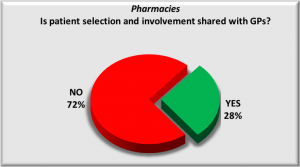
37% of the pharmacies asked said that they make modalities available to remind a patient to take their medicine. The sending of SMS messages stands out here, followed by telephone calls and alerts via an app (Fig. 15 & 16).
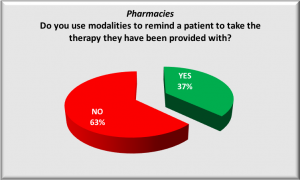
In 28% of cases, telemedicine services were also available. This was mostly in the form of tele-cardiology and the telemonitoring of blood pressure.
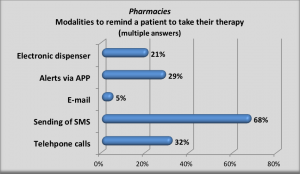
Initiatives supporting therapeutic adherence that have been put in place at pharmacies are carried out substantially to the same extent in collaboration with private subjects and institutions. Less frequent, however, are collaborations with the private social sector.
However, the growing attention that pharmacies are paying to adherence to therapies does not seem to be fully understood by citizens. In fact, on the user side, there have only been a few recent occasions for citizens to participate in prevention and screening campaigns promoted at pharmacies. The opportunities offered to them to take advantage of support services from the pharmacy in order to increase adherence to prescribed therapies have been even fewer: only 12% of respondents benefited from them.
On a more positive note, it should be highlighted that the benefit in terms of improving one’s own adherence to therapy appears ‘very significant’ for 33% of those surveyed, and ‘quite significant’ for another 51%. 13% of people rated it as being ‘not very significant’.
Conclusion
To summarise, this second Report confirms that citizens recognise the role of the pharmacies in support of health and therapeutic adherence as pivotal, that pharmacies are enhancing patients’ therapy prevention and monitoring, and that the citizens significantly rely and trust in pharmacies and pharmacists. An analysis of the report also shows that a structured commitment from the public is still missing, and that the development of the pharmacy moves in an uneven way throughout the territory.
It is excellent that pharmacies and pharmacists have reached a point whereby they are the recipient of so much trust. Indeed, this is necessary if they are to go on to successful evolve into a ‘pharmacy of services’, which, following the long-awaited agreement at the State-Regions Conference now declared, a roadmap has now been developed for in order to move from regional and local trials and so become established at the national level.
The Report also demonstrates that rural pharmacies along with pharmacies from deprived areas are performing excellent work despite the many difficulties they face, including the scarcity of resource spaces and equipment.
The Pharmacy represents an important health garrison in the internal areas of the nation, an essential tool to use in the strategies and actions against health inequalities. And the role that pharmacies play is even more exalted in the current context of the COVID-19 pandemic. In fact, the Third Edition of the Annual Report on Pharmacies from a citizen perspective will focus precisely on the contribution that the Italian pharmacies are offering in the management of the health emergency.
All chart information source: Cittadinanzattiva – Annual Report on Pharmacies 2019
Maria Vitale
Project Manager
Civic Evaluation Agency
Cittadinanzattiva
+39 06 367181
m.vitale@cittadinanzattiva.it
Tweet @Cittadinanzatti
Tweet @activecitnet
www.cittadinanzattiva.it
www.activecitizenship.net
Mariano Votta
Responsible for EU Affairs
Cittadinanzattiva
Director
Active Citizenship Network
Maira Cardillo
Community & Fellowship Assistant
Active Citizenship Network
EU branch of Cittadinanzattiva
Please note, this article will also appear in the second edition of our new quarterly publication.









